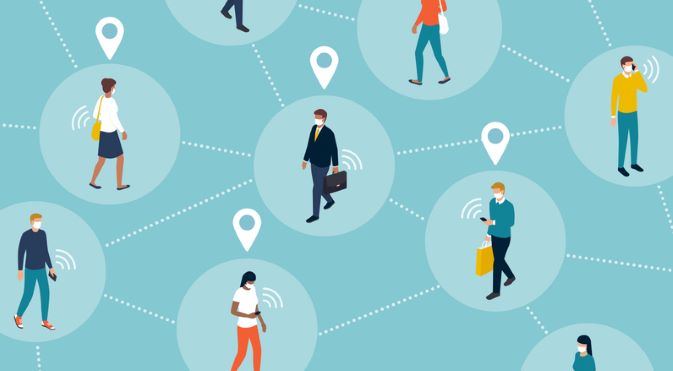According to a special wave of the Booth/Kellogg Financial Trust Index, Americans have bought into social distancing rules. However, most of the respondents are unwilling to give up their privacy to allow a digital form of tracking because they don’t trust the federal government.
With the decline in the number of daily Covid-19-related deaths, the desire to reopen the economy and move to a Phase 2 in the policy response to the coronavirus is growing. In the absence of a readily-available vaccine or a winning cocktail of antiviral drugs, testing and tracking may be some of the best policy tools for a successful reopening of the economy.
Tracking by tapping into cellphone location data has been implemented in other countries such as Israel and South Korea and is under consideration in many European countries.
Both testing and tracking face serious technical challenges. Yet, even if the technical challenges are overcome, the success of any combination of the two depends upon widespread compliance, which cannot be obtained simply through police enforcement. How can we achieve willing compliance? A special wave of the Chicago Booth- Kellogg School Financial Trust survey finds that the government has a lot of work to do.
The survey, conducted between Monday and Saturday last week on a representative sample of 1,000 Americans, contains both good and bad news regarding Americans’ willingness to comply.
The good news is that Americans have bought into social distancing rules: 79 percent declare they wear a mask when they buy groceries; 60 percent were not in close physical contact with more than 2 people outside of their housemates, and 63 percent said that they either worked from home or they stayed home for other reasons.
The bad news is that most Americans are unwilling to give up their privacy to allow a digital form of tracking, the only form with any chance to work.
Asked whether they would approve of the government using a mobile phone app to track the movement of everyone in the country to reduce the spread of infection if this reduces the length of the stay-home requirement by two weeks, only 34 percent responds positively. Raising the benefit to a reduction of two months in the length of the stay-home requirement, only an extra 11 percent agree.
Thus, 55 percent of the people are unwilling to be tracked by the government even if this results in two additional months of lockdown. Interestingly, this response came in spite of the fact that only 6 percent stated that individual freedom is more important than protecting people at risk from coronavirus.
Thus, Americans are not against taking measures to reduce the spread of the virus such as social distancing or wearing masks but they particularly dislike the form of intervention that appears to be most effective. Why? Correlation is not causation, but one big reason might be: only 30 percent of the respondents trust the US federal government, and those people are much more likely to accept to be tracked.
If the government wants to move to Phase 2, it needs to do a lot of convincing. First of all, it needs to convince people that it will not abuse this power. As there is a due process to authorize a wiretapping and a rigid process to handle the information acquired through it, the government should create a similar process for tracking information obtained via phone apps. If it does not overcome this lack of trust, there is not hope.
Most importantly, the government has to tell Americans the truth: we have already lost the privacy we are longing to protect. We lost it when we blindly signed all the terms of use that Facebook, Google, Apple, and many other digital platforms have put in front of us. We are already tracked, listened to, spied in every instant of our lives to allow digital ads to target us more accurately. Why shouldn’t we want to be tracked to save lives and the economy?
Only if the government is willing to explain how little privacy we have left would the American people accept the Faustian pact in front of us: tracking for a faster (partial) reopening of the economy.
The consequences would be good for the economy in general, but potentially devastating for an entire industry that has profited from silence on the level of digital surveillance already existing in this country.
Would the President and the US government be willing to be candid about the loss of privacy already experienced by American citizens to save the economy?
Efraim Benmelech is the Harold L. Stuart Professor of Finance, the Director of the Guthrie Center for Real Estate Research at the Kellogg School of Management.
Paola Sapienza is the Donald C. Clark/HSBC Chair in Consumer Finance Professor at the Kellogg School of Management at Northwestern University.
Luigi Zingales is the Robert R. McCormack Distinguished Service Professor of Entrepreneurship and Finance and the Faculty Director of the George J. Stigler Center for the Study of the Economy and the State at the University of Chicago Booth School of Business.
Editor’s note: this post was updated on April, 28th to make more explicit that the relationship between lack of support for contact tracing measures and lack of trust in government is correlation and not causation
ProMarket is dedicated to discussing how competition tends to be subverted by special interests. The posts represent the opinions of their writers, not necessarily those of the University of Chicago, the Booth School of Business, or its faculty. For more information, please visit ProMarket Blog Policy.







